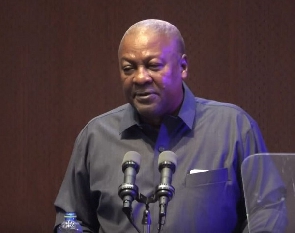Former President John Dramani Mahama has said the new debt operation by the government will worsen the plight of the local private sector.
He noted that the government’s unilateral offer to pay zero interest in 2023 on existing domestic bonds and a suppressed interest of between 5 and 10 percent if the maturity dates are extended will further worsen the situation of the private sector.
Speaking at the 13th Graduation Ceremony of the Accra Business School over the weekend, Mr lamented that “a worst-case scenario is the contemplated compulsory extension of maturities on Government bonds and the haircut investors will have to take if they decide to cash out because they can’t wait that long.
“People have lost value on their investments and could potentially lose even more.”
Finance Minister Ken Ofori-Atta has also over the weekend announced that under the expected IMF Programme to be announced, “domestic bondholders will be asked to exchange their instruments for new ones”,
Also, “existing domestic bonds, as of 1 December 2022, will be exchanged for four new bonds maturing in 2027, 2029, 2032, and 2037”.
“The annual coupon on all of these new bonds will be set at 0% in 2023, 5% in 2024, and 10% from 2025 until maturity”, he announced Sunday evening (4 December 2022).
Coupon payments will be semi-annual, he said
The government is currently negotiating a programme with the International Monetary Fund for a $3-billion credit facility programme, thus, necessitating the debt restructuring exercise.
Read Mr. Ofori-Atta’s full address below:
Good Evening Ghanaians,
In the Budget Statement presented to Parliament on November 24th, I announced that government will undertake a debt operation programme.
The broad contours of the Debt Sustainability Analysis has been concluded and I am here this evening to provide some details on Ghana’s Domestic Debt Exchange which will be launched tomorrow.
External debt restructuring parameters will be presented in due course.
Under the Programme, domestic bondholders will be asked to exchange their instruments for new ones.
Existing domestic bonds as of 1st December 2022 will be exchanged for a set of four new bonds maturing in 2027, 2029, 2032 and 2037.
The annual coupon on all of these new bonds will be set at 0% in 2023, 5% in 2024 and 10% from 2025 until maturity.
Coupon payments will be semi-annual.
Our commitment to Ghanaians and the investor community, in line with negotiations with the IMF, is to restore macroeconomic stability in the shortest possible time and enable investors to realize the benefits of this Debt Exchange.
The Government of Ghana has been working hard to minimise the impact of the domestic debt exchange on investors holding government bonds, particularly small investors, individuals, and other vulnerable groups.
In line with this:
Treasury Bills are completely exempted and all holders will be paid the full value of their investments on maturity. There will be NO haircut on the principal of bonds. Individual holders of bonds will not be affected.
The government recognises that our financial institutions hold a substantial proportion of these bonds.
As such, the potential impact of this exchange on the financial sector has been assessed by their respective regulators.
Working together, these regulators have put in place appropriate measures and safeguards to minimise the potential impact on the financial sector and to ensure that financial stability is preserved.
Specifically:
The Bank of Ghana, the Securities & Exchange Commission, the National Insurance Commission, and the National Pensions Regulatory Authority will ensure that the impact of the debt operation on your financial institution is minimized, using all regulatory tools available to them.
A Financial Stability Fund (FSF) is being established by Government with the help of development partners to provide liquidity support to banks, pension funds, insurance companies, fund managers, and collective investment schemes to ensure that they are able to meet their obligations to their clients as they fall due.
These are difficult times and we count on the support of all Ghanaians and the investor community to make the exercise successful.
We are confident that these measures will contribute to restoring macroeconomic stability.
With your understanding and support and that of the entire investor community, we shall overcome our current difficulties, and with the help of God, put our economy back on the path of renewed and robust growth.
As 1st Samuel 30:19 says, nothing was missing, small or great.
I say to you, nothing will be lost, nothing will be missing, and nothing will be broken.
We will, together, recover all.
Thank you and God bless our homeland Ghana.
Meanwhile, an IMF staff team, led by Stéphane Roudet, mission chief for Ghana, has been visiting Accra from, Thursday, 1 to 13 December 2022 to continue discussions with the authorities on the country’s post-COVID programme for economic growth and associated policies and reforms that could be supported by a new IMF lending arrangement.
The IMF staff will also further engage with other stakeholders during the visit.
Ahead of the visit, Mr Roudet said: “We have had productive discussions with the Ghanaian authorities over the last few months and look forward to our engagement in Accra”.
“Our objective for this visit is to make further progress toward reaching an agreement on policies and reforms that could be supported by an IMF lending arrangement”.
“The IMF remains fully committed to help Ghana restore macroeconomic stability, bring relief to Ghanaians in this time of crisis, and lay the foundation for more inclusive growth.”
In Ghana’s 2023 budget, Finance Minister Ken Ofori-Atta said the government and the IMF have agreed on programme objectives, a preliminary fiscal adjustment path, debt strategy and financing required for an extended credit facility programme to be in line with the government’s Post-COVID-19 programme for Economic Growth (PC-PEG).
The PC-PEG is the government’s blueprint to restore macroeconomic stability, promote debt sustainability, sustain economic recovery and support structural reforms.
Updating the house on the negotiations so far, Mr Ofori-Atta said: “Mr. Speaker, since the government announced its engagement with the International Monetary Fund for a supported programme on 1 July 2022, we have made “substantial progress”.
The Fund, he said, has assured the government of its “strong commitment and support in these difficult times”.
Politics of Monday, 5 December 2022
Source: classfmonline.com













